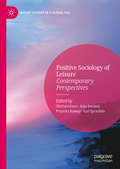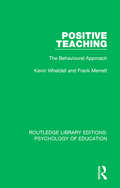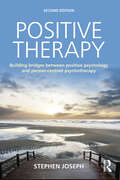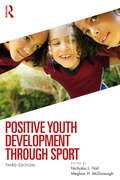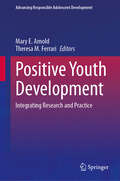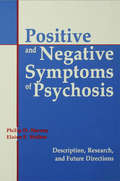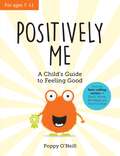- Table View
- List View
Positive Schooling and Child Development: International Perspectives
by Sibnath DebThis volume discusses the importance of positive schooling in producing responsible and potentially productive adults. Students are generally more motivated to do well and to realize their full potential in schools that have a positive schooling climate, where they feel safe, included and supported. Nevertheless, the reality in today's schools is very different. This volume discusses the major challenges faced by children and adolescents in schools, including problems with curricula, safety issues, lack of inclusive policies, non-availability of teachers, ineffective teaching, insensitivity towards students’ issues, improper evaluation methods, harmful disciplinary measures, and so on. Experts in child psychology and education discuss these issues at length in this volume and offer viable solutions for policymakers, school administrators, teachers and parents to make suitable changes and create a positive atmosphere in educational institutions. This volume further discusses the role of various stakeholders---school principals, teachers, counsellors and psychologists---in addressing these challenges. In addition, it raises other, emerging issues which have not been covered in previous volumes on this topic and offers evidence-based suggestions to address them. The intended readership of the volume is researchers and students of psychology, education, sociology, social work and public health, and school teachers, administrators and teacher-trainers.
Positive Sexuality: A Promising Future for Sex Research, Education, and Practice
by D J Williams Emily E. PriorThis book focuses on an emerging, multidisciplinary, positive sexuality framework that guides sexuality research, education, and practice.Using this positive sexuality framework, this book will provide helping professionals and others with current research and information on topics and populations that are often missed or misrepresented, including but not limited to: lesbian, gay, bisexual, asexual, and other orientations; transgender, nonbinary, and other non-cisgender identities; seniors; sex workers; racial minorities; and other marginalized peoples. This framework, based on the social and behavioral sciences, can be used in tandem with other theoretical frameworks, modalities, and methodologies to better support a growing, multifaceted, and unique human population. Chapters are authored by topic experts and utilize the most recent scholarship pertaining to positive sexuality. Readers will come to understand diverse sexuality more completely and inextricably linked to other parts of one’s identity and learn to address diverse sexual topics and issues more openly and with a spirit of compassion and human connectedness.This edited volume is a must-read for sexuality researchers, clinicians, helping professionals, policymakers, and students from diverse educational backgrounds who are interested in human sexuality.
Positive Sociology of Leisure: Contemporary Perspectives (Leisure Studies in a Global Era)
by Karl Spracklen Anju Beniwal Shintaro Kono Priyanka BawejaThis edited collection explores Positive Sociology of Leisure (PSL) as a subfield relating to leisure studies, sociology of leisure, and sociology of happiness. Defined as an area of research that examines social aspects of leisure life with a focus on the optimal functioning of relationship, group, community, organization, and other social units, PSL differs from more critical forms of sociology in that its starting point is social positives. The contributions draw on a range of diverse disciplinary backgrounds to consider various meanings of leisure across themes such as: ageing; sex, sexuality and family; community, youth, and education; and arts and creativity. Positive Sociology of Leisure will be a key reference within the field of sociology of leisure, as well as an important introductory book for those interested in leisure studies.
Positive Special Education: Theories, Applications and Inspiration
by Monica Reichenberg Ann-Katrin Swärd Catherine ShiptonPositive Special Education spotlights the power of positive special education, combining insights from researchers and teachers in special education from several countries. The expert team of authors, being both teachers and academics, highlight the powerful influence of teachers fostering optimistic approaches as well as the impact a positive educational experience has on young students. Instead of focusing on medical perspectives and individual difficulties, this book’s uniqueness lies in showcasing how educators, students, and care workers can be empowered to overcome daily challenges by changing beliefs and attitudes. Based on extensive experience in schools across Sweden and the UK, this book: contains a history of positive special education and central theoretical concepts such as self-efficacy, implicit theories, and inclusion; explores the potential of digital tools and how they can support students with their learning and development; focuses on instructional methods in reading, writing, and vocabulary development. Practical case studies throughout the book provide various examples for educators to apply the principles of positive special education in different learning environments. It is a must-read for teachers in SEND and mainstream schools, in preschool, pre-service teachers as well as undergraduate or masters’ students in education.
Positive Teaching: The Behavioural Approach (Routledge Library Editions: Psychology of Education)
by Kevin Wheldall Frank MerrettProblems of classroom management and control are a recurring concern for many teachers. Disruptive behaviour and inattention hinder effective learning and impose a constant drain upon the teachers’ emotional resources. Continual nagging at children only increases teacher stress: what is needed is an effective alternative set of strategies. Originally published in 1984, Positive Teaching seeks to meets this need by presenting the behavioural approach to teaching in a clear, direct and lucid way. By adopting the behavioural approach, problem behaviour can be minimised, or rapidly nipped in the bud when it does arise. While punishment may be used in an attempt to stop almost any kind of behaviour, only the appropriate use of positive methods applied contingently, immediately and consistently can teach new, more adaptive behaviour. This is a crucial issue in real teaching and is rarely encountered or even discussed in most teacher education programmes. It is the central focus of Positive Teaching. This book is for all teachers, from the beginning student to experienced head teachers; for those teaching in a first school, and for those teaching sixth-formers; for those experiencing difficulties and for those whose authority is already well established. The behavioural approach offers practical support to those who are struggling and a rationale for the effective, positive strategies of the successful. We can all improve our teaching.
Positive Therapy: Building bridges between positive psychology and person-centred psychotherapy
by Stephen JosephThe applications of positive psychology are different from traditional interventions in therapy in that they are focused on building strength, resilience and well-being rather than being restricted to simply treating disorder. Since the publication of the first edition of Positive Therapy, there is now a comprehensive body of applied positive psychology research to which practitioners may turn in order to inform their own practice, and that sees its purpose as the facilitation of human flourishing and optimal functioning. However, much of this research and its implications are only now becoming more widely understood in counselling and psychotherapy. This new and expanded edition of Positive Therapy shows how the latest thinking in positive psychology can be applied to psychotherapeutic practice, and specifically to person-centred therapy. Making the links between positive psychology and psychotherapy explicit, Stephen Joseph describes the new tools that practitioners can draw upon to help and facilitate positive functioning in their clients. New material includes: An update of the latest positive psychology research A new preface, explaining how positive psychology principles can now be applied to therapeutic practice Focus on positive psychology measurement tools Positive Therapy will be essential reading for all psychotherapists, counsellors, social workers, coaches, psychologists and trainees interested in exploring how they engage with clients, and the implications of this engagement in practice.
Positive Time-Out: And Over 50 Ways to Avoid Power Struggles in the Home and the Classroom (Positive Discipline)
by Jane NelsenDiscover the Power of Positive Time-OutTime-out is one of the most popular disciplinary techniques used in homes and schools today. But instead of being the positive, motivating, experience it should be for children, it is often punitive, counterproductive, and damaging to their gentle psyches. In this book, bestselling parenting author Jane Nelsen shows you how to make time-out a positive learning experience for children. Inside, you'll discover how positive time-out can teach children the art of self-discipline and instill such invaluable qualities as self-confidence and problem-solving skills. You'll also learn how to: ·Make time-out an encouraging experience ·Develop an attitude and action plan to avoid power struggles with children ·Empower children by involving them in the behavior changing process ·Understand the mistaken goals of negative behavior "Gives parents and teachers the encouragement and tools they need to help children handle their own behavior."--Sheryl Hausinger, M.D., Texas Children's Pediatric Associates and mother of three "Offers more than 50 ways that parents can set limits while still encouraging their kids. It should be in every doctor's waiting room."--Jody McVittie, M.D., family physicianFrom the Trade Paperback edition.
Positive Word Power: The Language Of Friendship And Happiness: For Teens: The Torah Wisdom On Human Interaction Arranged For Daily Study
by Chana Nestlebaum Shaindy AppelbaumFriends, classmates, parents, siblings... they're what we cherish most in life. Now you can learn how to protect your greatest treasure from damage, keeping your relationships shining bright. It's all in the power of the words you speak. Learn the answers to such vital everyday questions as: Is a joke always funny? Is criticism always constructive? Does praise always build others up? How can I deal kindly with someone who annoys me? What if someone is not my type? How should I express anger? In 2009, The Chofetz Chaim Heritage Foundation produced Positive Word Power, based on "The Power of Words" by Rabbi Zelig Pliskin, which shone a bright light on the issue of ona'as devarim — hurting others with words. This daily learning sefer has been taken up by thousands of Jewish men and women who have learned how to recognize and change those thoughts and character traits that spur nice people to say hurtful things. Now The Chofetz Chaim Heritage Foundation brings these priceless lessons to you, teenage readers, through practical scenarios, strategies and discussion questions that reflect the unique challenges of your life. Positive Word Power for Teens will sensitize you to the impact of words you use and hear every day and help you shed negative habits. Through our words, each of us has the power to paint for ourselves a bright and loving world, or a dark and lonely one. With an investment of just a few minutes a day, you can learn how to choose the beautiful hues of kindness and sensitivity, and paint a world you'll be happy to live in today and for the rest of your life!
Positive Youth Development in Global Contexts of Social and Economic Change
by Anne C. Petersen, Sílvia H. Koller, Frosso Motti-Stefanidi, and Suman VermaThe youth of the world are our most important assets. When youth develop positively, they have the power to benefit themselves, their families, communities, and societies. These tremendous benefits accrue for many generations, so investments in youth represent a highly cost-effective opportunity for positive change. This is the first volume to focus globally on the effects of social and economic change on youth, and on the opportunity to support youth through policy, programs, and interventions to develop positively despite challenges. The chapters in this volume highlight research demonstrating youth assets and resilience as well as programs and interventions that increase the likelihood that youth will thrive. Many chapters also draw attention to opportunities for youth leadership, helping youth to develop their strengths as they benefit their communities. Additional chapters focus on promoting optimal youth development in the presence of adversity, risk, or challenge, taking into consideration the potential and capacity of the young person. Finally, the ecological system theory is a strong influence in many chapters that examine the inter-relationship of different social contexts such as family, peers, school, and work. Positive Youth Development in Global Contexts of Social and Economic Change is both a vision for the future and an ideology supported by a new international vocabulary for engaging with youth development. Developed by researchers across interdisciplinary fields, the volume has enormous policy implications for lawmakers given the surge in youth population in many parts of the world.
Positive Youth Development through Sport
by Nicholas L. Holt Meghan H. McDonoughCutting through the political rhetoric about the power of sport as a tool for social change and personal improvement, this book offers insight into how and why participating in sport can be good for children and young people.Still the only book to focus on the role of sport in positive youth development (PYD), it brings together high-profile contributors from diverse disciplines to critically examine the ways in which sport can be used to promote youth development. Now in a fully updated, revised, and expanded third edition, Positive Youth Development through Sport covers a wider range of disciplines including sport psychology, development psychology, physical education, sport development, and sport sociology. With every chapter asking why, what, so what, and what next, the book introduces the theoretical basis and historical context of PYD, quantitative and qualitative methods for assessing PYD in sport, and the potential of PYD in sport across different ages and abilities. This edition includes brand-new chapters on PYD in schools, in Indigenous populations, and across the lifespan, as well as new material on evaluating PYD programs and new case studies of PYD around the world.This is invaluable reading for all students, researchers, educators, practitioners, programmers, and policy makers with an interest in youth sport.
Positive Youth Development through Sport: second edition (Routledge Studies In Physical Education And Youth Sport Ser.)
by Nicholas L. HoltCutting through the political rhetoric about the power of sport as a tool for social change and personal improvement, this book offers insight into how and why participating in sport can be good for children and young people. As the first text to focus on the role of sport in positive youth development (PYD), it brings together high-profile contributors from diverse disciplines to examine critically the ways in which sport can be used to promote youth development. Now in a fully updated, revised and expanded new edition, Positive Youth Development through Sport covers a wider range of disciplines including sport psychology, development psychology, physical education, sport development and sport sociology. Its three main sections focus on: the theoretical and historical contexts of PYD quantitative and qualitative methods for assessing PYD in sport the potential of PYD in sport across different ages and abilities. With expanded guidance on how to apply positive youth development in practice, this is essential reading for all students, researchers, educators, practitioners and policy makers with an interest in youth sport.
Positive Youth Development: Integrating Research and Practice (Advancing Responsible Adolescent Development)
by Mary E. Arnold Theresa M. FerrariThis book presents positive youth development research in easy-to-understand concepts that have direct and clear application to youth development practice. Using the 4-H Thriving Model as an example, it discusses key areas of youth development research, such as developmental settings, learning and development, and youth thriving, in the context of their relevance to effective youth development practice. Each chapter examines a particular aspect of youth development research, providing a succinct summary of the topic, detailing implications for youth development practice, and offering guidance for translating the research into practice. Contributors introduce the need for high-quality, science-based youth development programs, the importance of high-quality youth development settings, critical facets of youth thriving, and the benefits of such programs to society writ large. Key areas of coverage include: The science of learning and development as well as the role of learning and meaning making Positive youth development program models and high-quality youth program settings Youth belonging and equity in youth programming Developmental relationships, challenge and growth mindset, and prosocial development as well as purpose, hope, and identity Transcendent awareness, emotional regulation, and self-regulation and goal setting Positive Youth Development is an essential resource for all professionals, clinicians, and practitioners as well as researchers, educators, and graduate stud
Positive and Negative Symptoms in Psychosis: Description, Research, and Future Directions
by Philip D. Harvey Elaine E. WalkerFirst published in 1987. Routledge is an imprint of Taylor & Francis, an informa company.
Positively Happy: Routes to Sustainable Happiness (The Positive Psychology Workbook Series)
by Sonja Lyubomirsky Jaime KurtzIn a recent study of more than 10 thousand people from dozens of countries researchers discovered that happiness was prized over other highly desirable goals such as "falling in love" and "getting into Heaven." In this book, experts Jaime Kurtz and best-selling author Sonja Lyubomirsky provide a crash course in increasing personal happiness. The offer a variety of happiness self-tests, specific tools for boosting happiness, and a research based argument that pursuing happiness is beneficial. This is not empty-headed "happiology" though; the authors wisely counsel against a one-size-fits-all approach to intervention and help you individualize your own pursuit of happiness. Positively Happy is one title in the Positive Psychology Workbooks series. These workbooks introduce readers to a variety of solid science and useful tools for improving life, relationships, and overall mental health. Each workbook contains practical suggestions and offers readers opportunities to reflect and experiment with real world tools. A noted expert in his or her respective field writes each book in this series.
Positively Me: A Child's Guide to Feeling Good
by Poppy O'NeillThis activity book is for children aged 7–11 yearsIt’s full of great information, fun activities and top tips to help your child feel happy and confident Does your child struggle with low mood?Perhaps they worry that they are not good enough and prefer not to try?Do they find it difficult to speak up in class or make friends?These could be signs that your child is experiencing feelings of low self-worth.This practical guide combines cognitive behavioural therapy and mindfulness methods with simple activities to help your child to boost their mood and sense of self-worth. It’s aimed at children aged 7–11 because a lot happens in these years that can impact a child’s emotional well-being, not just now but for years to come.Your child will be guided, with the help of Chip – a friendly and supportive character they can identify with – through fun and engaging activities which are interspersed with useful tips, inspirational affirmations and practical information for parents and carers.
Positively Teen: A Practical Guide to a More Positive, More Confident You
by Nicola MorganAn uplifting and optimistic guide to navigating the ups and downs of teen years and preparing for adulthood.Author Nicola Morgan is an international expert on teen development and mental health. During her talks to parents of pre-teens, she immediately sensed two overriding emotions: fear and pessimism. Parents were worried about their children becoming teenagers, assuming that it would be a negative experience. Not only is that a sad outlook on the teenage experience--it doesn't have to be true! Breezy and compassionate, Positively Teen teaches teens how to approach their adolescent years with optimism and understanding, giving them the skills they need to develop long-term well-being. Full of practical, proven strategies, it includes advice on how to flourish both physically and mentally--from learning to do things you enjoy, to understanding how to look after your diet, exercise and attitude, to understanding your personality. With these strengths and skills in hand, teens will learn to weather any storm and thrive on the challenges of this time in their lives.
Positives Altern und Prekarität: Theorie, Politik und soziale Realität im vergleichenden deutschen Kontext
by Irina Catrinel CrăciunDieses Buch untersucht positives Altern aus der Perspektive der Prekarität und zielt darauf ab, Theorien des positiven Alterns in aktuellen sozialen Kontexten zu verankern. In den letzten Jahren war die Forschung zum Thema Altern von wachsenden Meinungsverschiedenheiten zwischen Befürwortern des Modells des erfolgreichen Alterns und kritischen Gerontologen geprägt, die auf die zunehmenden Ungleichheiten, Benachteiligungen und die Prekarität hinweisen, die das Alter charakterisieren. Dieses Buch schließt eine Wissenslücke, indem es eine alternative Sichtweise auf positives Altern bietet, die durch Prekarität und deren Auswirkungen auf Projektionen zum Thema Altern informiert ist. Der erste Teil des Buches stellt das Altern in einen breiteren theoretischen und empirischen Kontext und untersucht die komplexen Zusammenhänge zwischen Ansichten über das Altern, Theorien des erfolgreichen Alterns, Politik und sozialer Realität. Der zweite Teil nutzt Ergebnisse einer qualitativen Forschung, die in Deutschland durchgeführt wurde, um die Diskrepanz zwischen den Idealen des erfolgreichen Alterns und sowohl negativen als auch positiven Ansichten über das Altern sowie Vorbereitungsstrategien auf das Altern, die durch Prekarität inspiriert sind, zu veranschaulichen. Die Ergebnisse dieses Abschnitts bieten einen soliden Ausgangspunkt für Vergleiche mit Ländern, die hinsichtlich der Wohlfahrtsregime und der Alternspolitiken sowohl Ähnlichkeiten als auch Unterschiede zu Deutschland aufweisen. Der abschließende Teil des Buches erörtert die psychologischen Implikationen dieser Ergebnisse innerhalb und außerhalb der deutschen Fallstudie und skizziert mögliche Lösungen für die Praxis. Dieses Buch bietet Gesundheitspsychologen, Gerontologen, Soziologen, Sozialarbeitern, Gesundheitsfachkräften sowie Studierenden und den älteren Menschen selbst ein besseres Verständnis für die Bedeutung des Alterns in prekären Zeiten und stärkt das Vertrauen, trotz Prekarität gut zu altern.
Positives Selbstmanagement für Lehrkräfte: Multimethodale Evaluation einer Maßnahme zur Gesundheitsförderung
by Natalie GouaséDas Modell „Gesund Lehren“ definiert Kompetenzen zur Förderung von Gesundheitsvariablen bei Arbeitnehmern und wird durch die Ergebnisse einer quantitativen Analyse empirisch untermauert. Im Kontext von Lehrkräften zeigt Natalie Gouasé in einem Feldexperiment, dass durch eine am Modell abgeleitete und an die spezifische Berufsgruppe adaptierte Präventionsmaßnahme bedeutend positive Effekte zur Verbesserung der psychischen Gesundheit erzielt werden können. Nicht nur personale Ressourcen wie Selbstwirksamkeit und Optimismus steigen, sondern auch langfristige Folgen wie chronischer Stress und depressive Verstimmung werden verbessert. Das Training umfasst die Anwendung von Techniken der Positiven Psychologie, Reduktion dysfunktionaler Kognitionen sowie die Verbesserung positiven Gesundheitsverhaltens. Biopsychologisch können die Effekte nicht nachgewiesen werden, was Anlass zu umfassender Diskussion gibt, Limitationen aufzeigt und die Relevanz multimethodaler Untersuchungen verdeutlicht.
Positividade Tóxica
by Whitney GoodmanUm livro que mostra como se manter realista num mundo obcecado em ser feliz. Todos os dias somos bombardeados com a necessidade de sermos positivos. Desde o «vai correr tudo bem» até ao «vê o lado positivo das coisas», é-nos dito constantemente que o segredo para a felicidade é silenciar a negatividade, onde e quando quer que surja, em nós e nos outros. Mas se toda esta positividade é a solução, porque é que grande parte das pessoas se sente ansiosa, deprimida e esgotada? Neste livro admiravelmente sincero, a autora partilha as últimas pesquisas e as histórias dos seus pacientes que revelam como o excesso de positividade pode ser nocivo, bem como formas simples de lidar com emoções difíceis. No final, será capaz de identificar a positividade tóxica à sua volta e alcançar uma vida com mais autenticidade, conexão e oportunidades de crescimento. «Este livro mudou-me para sempre. Em vez de usar palavras de validação, vou passar a pensar cuidadosamente no que dizer. Whitney Goodman revela a diferença entre ser útil e ser prejudicial.» Nedra Glover Tawwab, psicoterapeuta e autora bestseller «Positividade Tóxica é o antídoto para a psicologia superficial das mensagens motivacionais.» Caroline Dooner, autora de A Dieta do Que Se F*da
Positivity: Confidence, Resilience, Motivation
by Paul McKennaDo you want more optimism, confidence, resilience and motivation? Then this book is for you! We currently live in a time of unprecedented challenges, uncertainty, overwhelming stress, loss of hope at times and a need for mental strength and adaptability to a new way of life.Traditional 'positive thinking', trying to constantly tell yourself that everything is OK, no matter the circumstances, just isn't enough to make any lasting difference.After 30 years working as a therapist, Paul McKenna has developed a unique approach – one that can guide you towards an all-round feeling of positivity – putting you into optimal states of mind, building up your resilience and enabling good decisions and actions that lead to successful results in life.There is now irrefutable scientific evidence that shows that particular ways of thinking and acting produce tangible positive results in people's ability to deal with challenges and their overall quality of life. The research also shows that this mindset can be learned quickly just like any habit.And that is why this book is a practical psychological system in how to survive and thrive – how to discover your own natural most powerful resources for self-care, self-belief and for taking control of your life.
Positivity: Confidence, Resilience, Motivation
by Paul McKennaDo you want more optimism, confidence, resilience and motivation? Then this book is for you! We currently live in a time of unprecedented challenges, uncertainty, overwhelming stress, loss of hope at times and a need for mental strength and adaptability to a new way of life.Traditional 'positive thinking', trying to constantly tell yourself that everything is OK, no matter the circumstances, just isn't enough to make any lasting difference.After 30 years working as a therapist, Paul McKenna has developed a unique approach – one that can guide you towards an all-round feeling of positivity – putting you into optimal states of mind, building up your resilience and enabling good decisions and actions that lead to successful results in life.There is now irrefutable scientific evidence that shows that particular ways of thinking and acting produce tangible positive results in people's ability to deal with challenges and their overall quality of life. The research also shows that this mindset can be learned quickly just like any habit.And that is why this book is a practical psychological system in how to survive and thrive – how to discover your own natural most powerful resources for self-care, self-belief and for taking control of your life.
Positivity: Groundbreaking Research Reveals How to Embrace the Hidden Strength of Positive Emotions, Overcome Negativity, and Thrive
by Barbara FredricksonWorld renowned researcher Dr. Barbara Fredrickson gives you the lab-tested tools necessary to create a healthier, more vibrant, and flourishing life through a process she calls "the upward spiral." You'll discover: * What positivity is, and why it needs to be heartfelt to be effective * The ten sometimes surprising forms of positivity * Why positivity is more important than happiness * How positivity can enhance relationships, work, and health, and how it relieves depression, broadens minds, and builds lives * The top-notch research that backs the 3-to-1 "positivity ratio" as a key tipping point * That your own sources of positivity are unique and how to tap into them * How to calculate your current positivity ratio, track it, and improve it. With Positivity, you'll learn to see new possibilities, bounce back from setbacks, connect with others, and become the best version of yourself.
Positivity: Groundbreaking Research to Release Your Inner Optimist and Thrive
by Barbara FredricksonOne of the leading members of the positive psychology movement draws on cutting-edge research and lab-tested tools to explain: Why positivity is more important than happiness How it relieves depression, broadens minds, and builds lives How to tap into your own sources of positivity With Positivity, you'll learn to see new possibilities, bounce back from setbacks, connect with others, and become the best version of yourself.
Positivity: Groundbreaking Research to Release Your Inner Optimist and Thrive
by Barbara FredricksonDrawing on more than twenty years of scientific research into positive emotions, world renowned researcher Dr Barbara Fredrickson shows us that attaining positivity is not about striving to be an annoyingly and unnaturally cheerful `Pollyanna'. Rather, it is about putting into practice the `3-to-1 ratio' of positive to negative emotions, the crucial tipping point that will enable you to embark on an `upward spiral' towards a healthier, more vibrant, and flourishing life.
Positivity: How to Be Happier, Healthier, Smarter, And More Prosperous
by Harry EdelsonHarry Edelson is the son of an illiterate Russian immigrant whose husband left the family when Harry was an infant. He begins his book this way: “I grew up in the poorest neighborhoodin Brooklyn, which was the poorest neighborhood in New York City, and I was the poorest of the poor.” <P><P>But Mr. Edelson has no intention of wasting his life or our time by lamenting his childhood or anything else. He tells us, “I consider myself to be very lucky. I have been happy all my life even though I started out as poor as a child could be.” . . . If you want to be happy, it is all in your mind. So take control of your senses, determine to be happy, and develop a frame of mind that will make you and all those around you happy.” In Positivity: How to Be Happier, Healthier, Smarter, and More Prosperous Mr. Edelson reveals his secrets and tips for success from the vantage point of a person who has enjoyed having excellent health, a wide range of knowledge from a fine academic background enhanced by self-education, and fulfilling careers on Wall Street in technology, investment banking, and later as owner of a highly successful business in capital investments. Focusing on his strong belief in continuing education to increase skills that entertain us and help our careers, he extolls the benefits of being a speed-reader and increasing memory by learning the techniques of mnemonics, and he demonstrates interesting mathematical tricks that work for him. He also has plenty of good, practical financial advice for individuals of all means; and of course he is expansive on the value of positive attitudes. Mr. Edelson believes without a doubt that you can train your own mind for a lifetime of great happiness


